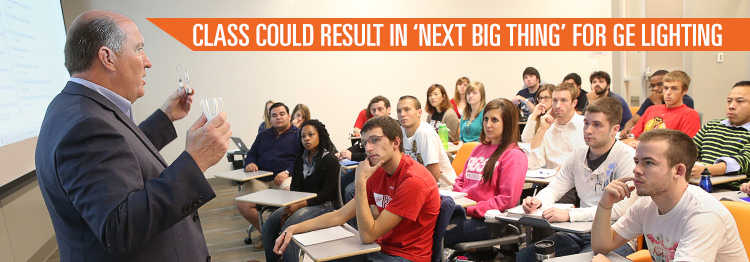Class could result in 'next big thing' for GE lighting
Class could result in 'next big thing' for GE Lighting

By Donna Greenwald
The century-old incandescent light bulb as we know it today has been in decline as consumers have demanded more efficient and longer-life options. Along with continuing to advance the latest energy-saving lighting technologies, GE Lighting sees an advantage in using new smart technology to develop and market an intelligent light bulb.
It also sees an advantage in tapping the creativity of the next generation of business people. The company is working with BGSU's College of Business Administration to offer students an opportunity to learn how a successful company develops concepts for the capabilities of these intelligent light bulbs as well as for marketing them to consumers. Through the collaboration, the students may also earn significant scholarships from GE.
The Senior Applied Business Experience (BizX) 4000 course is a hands-on, experiential course for seniors in the business college. BizX provides the seniors the opportunity to learn from a Fortune 500 company as part of a significant real-world project - the company's development of "the next big thing" in light bulbs. The need for the new light bulb is especially urgent since U.S. regulations for higher efficiency lighting products will phase out traditional 40-100 watt bulbs completely in 2014.
Three executives from GE Lighting - Steve Briggs, general manager of Global Product Management; Mike McVeigh, enterprise resource planning process leader; and John Villanueva, general manager of Digital Marketing - came to BGSU during Week 4 of the class to kick off the project with the students. During the two-hour presentation and discussion of the real-time case study, the executives charged the students with being creative and thinking "outside the box" in suggesting what an intelligent bulb should do to meet the needs of future households and fulfill current unmet needs. The company understands that "Millennials" - people born between 1980 and 2000 - will soon be creating households and buying light bulbs.
"...this is the culminating experience of a series of real world, active-learning business experience lab courses that started when they were freshmen"Briggs, who along with McVeigh earned degrees from the College of Business Administration, added that the students would need to keep manufacturing and retail costs in mind as they develop their innovations.
According to Villanueva, consumers will only pay a higher price for light bulbs if the value proposition is perceived to meet their needs, such as a light bulb that doubles as a security system. Manufacturers have developed energy-efficient, longer-lasting lighting alternatives to traditional incandescent bulbs such as halogen, compact fluorescent, and light emitting diode (LED) bulbs.
Among GE Lighting's latest energy-saving solutions is an intelligent light bulb developed in connection with its relationships with Lutron Electronics, a controls company, and Sam's Club. This new light bulb houses a receiver, which receives communications and is operated by a wireless controller. This "intelligent" LED technology could allow for such things as dimming remotely, alarm-based motion detection, color preferences, and daylight/nighttime sensing.
"The higher cost needs to be offset by use," Villanueva said.
The executives also challenged students to suggest distribution channels in their marketing plans.
Frank Kozak, an instructor in BGSU's Department of Management, is teaching the BizX course. His two classes are divided into 12 teams for the case study. Each team is to submit its marketing plan toward the end of the semester for GE Lighting personnel to review. From those 12 teams, GE Lighting will select the top four plans, and those teams will present their marketing plans to company executives during finals week.
"Engaging with a leading company facing a tremendous industry transformation is an invaluable experience for these students," Frank said. "The case study enables them to apply the business skills they have gained during their education in the College of Business in this real-world situation."
Based on the four presentations of the marketing plans for the intelligent light bulb products, GE Lighting will award the top team a $1,500 scholarship, the second place team a $1,000 scholarship, and the third team a $500 scholarship.
Students are excited about this unique academic-industry collaboration. Business student Dana Herr said the class project helps her to see how all of the business courses since freshman year have culminated in this final capstone, a total integration of business concepts.
Student Nam Vo added that the project gives students an opportunity to shine in front of a major corporation.
GE Lighting has been in the lighting business since the advent of the incandescent technology and has sustained a strong business model over the years. It continues to transform its business model to meet new market needs and consumer demands for energy-efficient technologies.
McVeigh noted that a number of GE Lighting employees are BGSU alumni, including company president and CEO Maryrose Sylvester, which motivated the company to connect with BGSU.
"While some other business schools have a 'real world' business project as a part of their curriculum, what makes BGSU so unusual is that this is the culminating experience of a series of real world, active-learning business experience lab courses that started when they were freshmen," said Dr. Rodney Rogers, senior vice president for academic affairs and provost. "I am unaware of another business college that has this type of experience for undergraduate students in the U.S. This is very aligned with Dean (Raymond) Braun's strategy of providing the undergraduate business students with an active-learning educational experience."
Updated: 12/02/2017 12:56AM
